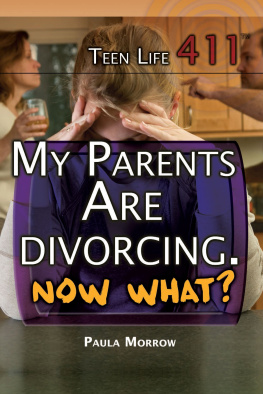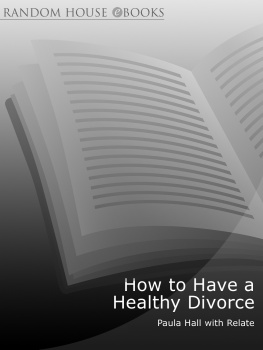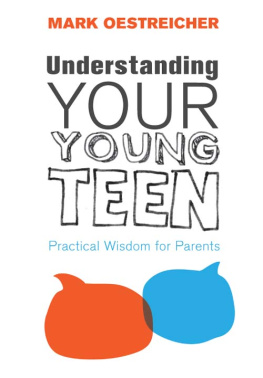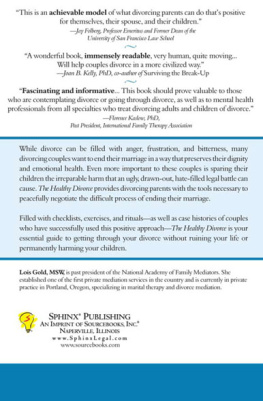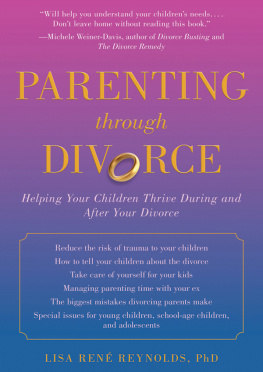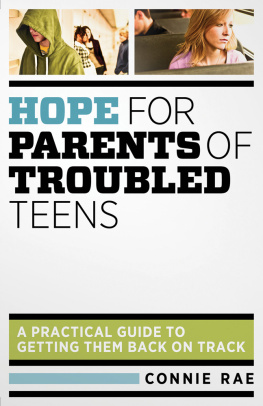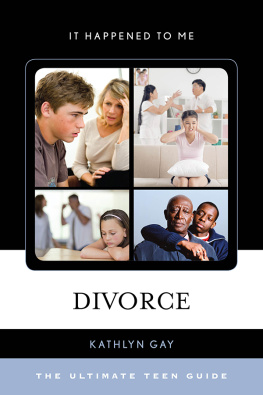Published in 2015 by The Rosen Publishing Group, Inc.
29 East 21st Street, New York, NY 10010
Copyright 2015 by The Rosen Publishing Group, Inc.
First Edition
All rights reserved. No part of this book may be reproduced in any form without permission in writing from the publisher, except by a reviewer.
Library of Congress Cataloging-in-Publication Data
Morrow, Paula.
My parents are divorcing. Now what?/Paula Morrow. First edition.
pages cm.(Teen life 411)
Includes bibliographical references and index.
ISBN 978-1-4777-7986-6 (library bound)
1. DivorceJuvenile literature. 2. Children of divorced parentsJuvenile literature. 3. Divorced parentsJuvenile literature. 4. TeenagersFamily relationshipsJuvenile literature. I. Title.
HQ814.M67 2014
306.89dc23
2014014182
INTRODUCTION
Y our life is about to change permanently. Your parents have told you they are going to get a divorce.
Maybe youve seen the signs and hoped you were wrong. Or maybe the announcement came as a total surprise to you. But now its real. You feel like the ground just collapsed under your feet.
Youre filled with questions: Whats going to happen to me? Where will I live? Will I have to change schools? How do I tell my friends? Am I a failure?
Is it my fault?
The first thing to do is settle that last question. No, its not your fault. The reasons for your parents divorcewhatever those reasons may beare between the two of them. You are never responsible for your parents actions.
After your heart stops pounding and you can take a deep breath, the second thing to know is that you can cope. No matter how dire life may seem right now, the earth is still turning, and the sun will come up tomorrow morning. The majority of parents are able to have an ongoing, loving relationship with their children after a divorce. And the majority of children with divorced parents can go on to have happy and successful lives.
Your parents are always angry, you hate hearing them yell at each other. But no matter how bad it gets, you don't really want them to divorce.
A lot depends on your personality and support network. Your personality was formed a long time ago, in your preschool years. You already have a good idea whether youre shy or outgoing, cautious or impulsive, logical or emotional, and many other features of your personality. These traits will affect how you respond to the divorce. Theres no right or wrong here; you are who you are. Focus on your personal strengths, and when youre feeling down, remind yourself whats good about you.
Your support network is made up of people you trust who care about you. Youre going through a rough patch, and you will need emotional and practical support though the coming weeks and months. Dont try to go it alone; allow yourself to accept support when it is offered and ask for it when it is not.
You are not alone. According to the National Center for Health Statistics, there are more than one million divorces in the United States every year. The majority of divorces occur in families with children under the age of eighteen. The 2010 Census reported over twenty-four million minor teens (ages twelve to seventeen) in the United States Of those, more than six million lived with their mother only; more than one million lived with their father only. Another one and a half million werent with either parent; they lived with grandparents, other relatives, friends, or foster families.
That means a lot of other kids and teens have faced what youre facing. You probably have friends with divorced parents, friends who can help you get through this.
There are also other adults in your community besides your parents you can turn to, adults who can be part of your support network. They might be neighbors, teachers, coaches, counselors, people at your place of worship, or parents of your friends.
Many organizations provide information and support. Interactive websites let you ask questions, join chat rooms, read what other people your age are saying, offer your own comments, find tips on ways to cope, and get advice from professionals. Some toll-free telephone hotlines have counselors available 24/7 to respond if you need to talk with someone immediately.
Your parents are divorcing each other, but you still have a family. After all, families arent defined by who lives where. Families are people who love and care for each other.
THE D WORD
Y our parents have said it: the D word. Its hanging in the air, naked and ugly, and there is no way to un-say it. Your parents have announced that they are going to get a divorce.
Some parents have been fighting for years, so youre used to hearing them yelling at each other. You dont like it, but it seems normal. On the other hand, some parents never fight in front of you and have been hiding their problems, so you had no clue anything was wrong. Either way, you dont want to hear your own parents use the D word.
All parents disagree from time to time. Maybe you wish yours wouldn't fight so much, but they're still your parents, and this is your home.
COMMON REACTIONS
Everyone is different, and no one else will have exactly the same combination of thoughts and feelings that you have right now. But everyone who has ever gone through this news has shared some similar reactions. It can be helpful to have an idea what to expect. You may feel some or all of these. Remember that there are no right or wrong feelings. Your feelings are normal for you. Whats important is how you deal with those feelings.
How Could They Do This to Me?
Parents have a special responsibility in this world: Its their job to take care of their children. From the tiny honeybees carefully tending baby bees in their hives to the huge elephant herds forming a circle around their calves when a predator approaches, parents instinctively put the safety, security, and welfare of their young above their own lives. Now, suddenly, your parents seem to be throwing your security out the window.
Its natural to feel a sense of betrayal. One little girl, after her father moved out, wrote him a letter asking who would fix her bike if it broke. What she was really asking was, Dont you care what happens to me? Even when you get older and know where to get your bike fixed (or your car or whatever else might break), theres still that awful sense that the absent parent has abandoned you.
In a way, the parent who did not leave may also seem to be abandoning you emotionally. He or she may be distant or preoccupiedindifferent to your pain and unresponsive to your needs. Sometimes its hard to know what hurts more, the physical absence or the emotional absence.
Believe it or not, neither parent has really abandoned you. Their differences are with each other, not with you. Theyre splitting up from each other, not from you. When a marriage fails, the spouses often feel like failures, too. They may be embarrassed or ashamed to talk with you. They may feel helpless to fix it, so they dont say or do anything.

